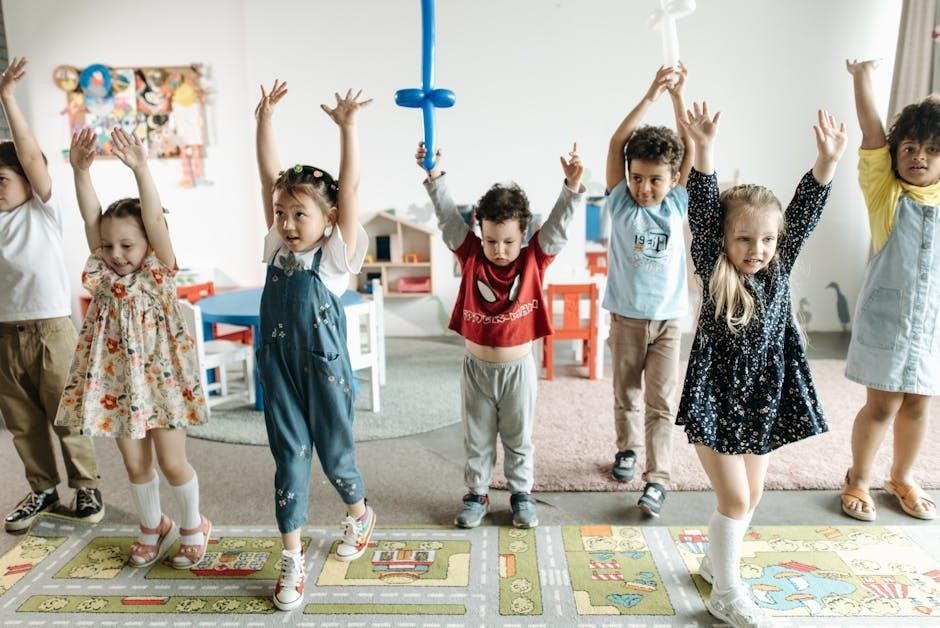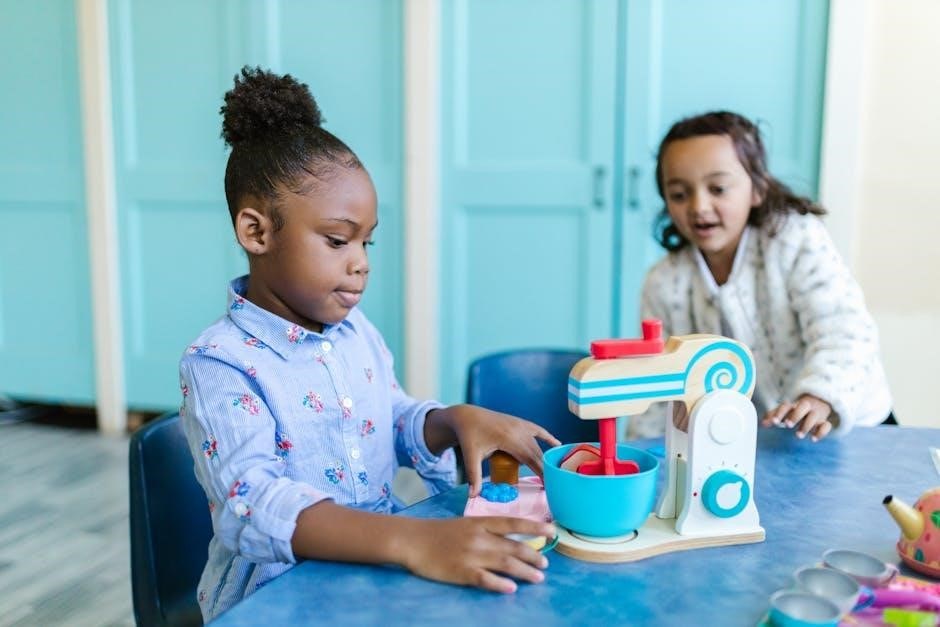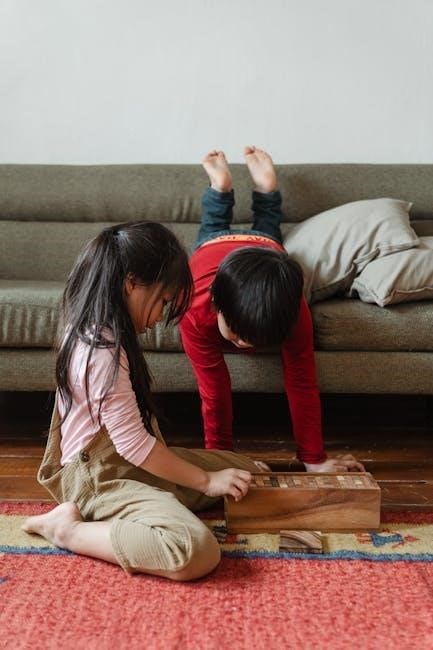social-emotional learning activities pdf free

Social-Emotional Learning (SEL) fosters essential life skills like self-awareness, emotional intelligence, and relationship management. It empowers students to navigate emotions, build connections, and make thoughtful decisions, supporting academic and personal growth;
Overview of SEL and Its Importance
Social-Emotional Learning (SEL) is a vital approach to education that equips individuals with essential life skills, including self-awareness, emotional intelligence, and relationship management. By integrating SEL into daily routines, educators and parents help children develop resilience, empathy, and decision-making abilities. Research highlights that SEL activities positively impact academic performance, with studies showing improved grades and test scores. These skills are crucial for fostering healthy relationships and achieving long-term success. SEL emphasizes understanding and managing emotions, fostering kindness, and encouraging constructive communication. It creates a supportive environment where children thrive academically, socially, and emotionally. Free resources like downloadable workbooks and lesson plans make SEL accessible to all, ensuring equitable opportunities for growth and development.
Benefits of Implementing SEL Activities
Implementing Social-Emotional Learning (SEL) activities offers numerous benefits for individuals of all ages. SEL fosters emotional resilience, helping individuals manage stress and anxiety while building confidence and self-esteem. It enhances academic performance by improving focus, motivation, and problem-solving skills. SEL also strengthens relationships by teaching empathy, communication, and conflict resolution. These skills reduce behavioral issues and create a positive, inclusive environment. Additionally, SEL activities promote self-awareness, enabling individuals to recognize and regulate their emotions effectively. Over time, these skills contribute to better mental health, improved social interactions, and increased success in both personal and professional life. By incorporating SEL into daily routines, educators and parents can empower individuals with lifelong tools for thriving in an ever-changing world.
Free Resources for SEL Activities
There are numerous free resources available for implementing Social-Emotional Learning (SEL) activities, making it accessible for educators and parents. Websites offer downloadable workbooks, lesson plans, and printable games that cater to various age groups. PDF guides provide structured exercises for self-awareness, emotional regulation, and relationship skills. Tools like Minecraft Education and Thrively offer engaging, game-based SEL content. Additionally, platforms like Teachers Pay Teachers (TPT) feature free worksheets and activities designed for PreK-12 students. Many resources include calming exercises, journaling prompts, and group games to foster empathy and collaboration. These materials are often adaptable to both classroom and home settings, ensuring consistent SEL development. By leveraging these free resources, educators and caregivers can create a supportive environment for social-emotional growth without additional costs.
Core Competencies of Social-Emotional Learning
Social-Emotional Learning (SEL) focuses on five core competencies: self-awareness, self-management, social awareness, relationship skills, and responsible decision-making. These skills help individuals understand emotions, manage behaviors, and build strong relationships.
Self-Awareness Activities
Self-awareness is the foundation of SEL, helping individuals recognize and understand their emotions, strengths, and weaknesses. Activities like journaling, emotional ID games, and I-Spy encourage students to identify and express feelings. Free PDF resources, such as “My Mouth Is A Volcano” and emotion identification worksheets, provide engaging tools for self-reflection. Students can use journals for daily reflections or participate in class discussions about personal values and goals; These activities foster a deeper understanding of oneself, promoting emotional intelligence and self-confidence. By incorporating these exercises, educators and parents can help students develop a strong sense of identity and emotional regulation skills. These resources are easily accessible online, making it simple to integrate self-awareness practices into daily routines.
Self-Management Activities
Self-management activities help students regulate emotions, set goals, and develop self-control. Techniques like mindfulness exercises, deep breathing, and calm-down bins are effective tools. Free PDF resources, such as “Calm Down Bin Printables” and “Emotional Regulation Worksheets,” offer structured activities to teach self-management. Games like “Marshmallow, Lava, or Chocolate” encourage patience and decision-making. These exercises enable students to handle stress and impulses, fostering resilience and focus. By practicing self-management, students can improve academic performance and maintain positive relationships. Educators can easily download these resources to create engaging lessons that promote emotional stability and self-discipline in both classroom and home environments.
Social Awareness Activities

Social awareness activities foster empathy, perspective-taking, and understanding of social norms. These exercises help students recognize and appreciate diverse backgrounds and cultures. Free PDF resources, such as “Acts of Kindness Worksheets” and “Emotional ID Games,” provide engaging ways to develop these skills. Activities like “I-Spy Feelings” encourage students to identify emotions in others, while group games like “Alphas and Omegas” teach cooperation and conflict resolution. Printable resources, such as “Social Awareness Bingo,” make learning interactive and fun. These tools help students navigate social dynamics, build stronger relationships, and contribute positively to their communities. By integrating these activities, educators can create inclusive environments that promote empathy and understanding among all learners.
Relationship Skills Activities
Relationship skills activities focus on fostering healthy communication, cooperation, and conflict resolution. Free PDF resources like “Teamwork Challenges” and “Conflict Resolution Workbooks” provide practical exercises to enhance collaboration. Games such as “Marshmallow Tower Building” encourage teamwork and problem-solving. Role-playing activities, like “Perspective-Taking Scenarios,” help students understand different viewpoints. Worksheets on active listening and empathy-building conversations are also available. These tools equip students with the skills to navigate social interactions effectively, build trust, and maintain positive relationships. By incorporating these activities, educators and parents can help students develop strong interpersonal connections and lifelong relationship skills.
Responsible Decision-Making Activities
Responsible decision-making activities empower students to weigh options, consider consequences, and choose wisely. Free PDF resources offer exercises like “Decision-Making Scenarios” and “Ethical Dilemmas,” which guide students through real-life situations. Games such as “Consequence Sorting” help students visualize outcomes of their choices. Worksheets like “Pros and Cons Charts” encourage critical thinking. Role-playing activities allow students to practice resolving conflicts and making ethical decisions. These tools help students develop self-awareness and accountability, leading to better choices in academics and personal life. By teaching responsible decision-making, educators and parents foster a sense of responsibility and prepare students for future challenges.

SEL Activities for Different Age Groups
Age-specific SEL activities cater to preschoolers, elementary, and middle school students, offering tailored exercises to enhance emotional growth and social skills at each developmental stage.
Activities for Preschoolers (PreK-5)
Social-emotional learning (SEL) activities for preschoolers focus on fostering emotional awareness, sharing, and cooperation. Simple games like “Emotional ID” and “I-Spy” help identify feelings and build empathy. Sharing activities, such as playing with blocks or coloring, teach cooperation. Storytime discussions encourage understanding different perspectives. Art projects, like drawing emotions, allow expression and self-awareness. Circle time activities promote group bonding and communication skills. These age-appropriate exercises are designed to be engaging and developmental, laying the foundation for future SEL growth. Free PDF resources, such as workbooks and lesson plans, provide structured tools for parents and educators to implement these activities effectively. These resources emphasize play-based learning to nurture young children’s social and emotional development in a fun and interactive way.

Activities for Elementary Students (Grades 2-5)
For elementary students, social-emotional learning (SEL) activities focus on developing empathy, teamwork, and problem-solving skills. Group activities like “Marshmallow Challenge” and “Kindness Chains” encourage collaboration and emotional intelligence. Role-playing exercises help students practice conflict resolution and understanding different perspectives. Printable worksheets and lesson plans, available in free PDF resources, guide educators in implementing these activities. Games like “Disgusting Team Sandwich” foster creativity and social awareness. Reflective journaling and emotion identification exercises strengthen self-awareness and self-management. These age-appropriate activities are designed to engage students while promoting essential life skills. Free PDF workbooks and lesson plans provide structured tools for teachers to integrate SEL into daily classroom routines, ensuring a supportive and inclusive learning environment for all students.
Activities for Middle School Students (Grades 6-8)
For middle school students, social-emotional learning (SEL) activities focus on building resilience, empathy, and decision-making skills. Collaborative projects like “Marshmallow Challenge” and “Acts of Kindness” encourage teamwork and emotional intelligence. Digital tools such as Minecraft Education and Thrively offer engaging, interactive lessons to foster self-awareness and relationship skills. Role-playing exercises and group discussions help students navigate complex social dynamics and develop conflict resolution strategies. Printable games like “Emotional ID” and “I-Spy” provide hands-on opportunities for students to recognize and manage emotions. Free PDF resources, including lesson plans and workbooks, are available to support teachers in implementing these activities. These age-appropriate exercises help middle school students develop essential life skills, preparing them for academic and personal success.

Free PDF Resources for SEL Activities
Explore free PDF resources offering SEL workbooks, lesson plans, and printable games. These tools support emotional growth and are easily accessible for educators and parents to implement effectively.
Downloadable Workbooks and Worksheets
Discover a variety of free downloadable workbooks and worksheets designed to support social-emotional learning (SEL). These resources offer engaging activities for students of all ages, focusing on skills like self-awareness, emotional regulation, and empathy. Many workbooks include exercises for identifying emotions, practicing mindfulness, and building healthy relationships. Worksheets often feature interactive elements, such as journaling prompts, puzzles, and reflection exercises, making SEL accessible and fun. Educators and parents can easily print these materials, ensuring students have hands-on tools to develop essential life skills. Whether for classroom use or home learning, these free PDF resources provide structured opportunities for growth and exploration.
Lesson Plans for Teachers
Teachers can access free downloadable lesson plans tailored to integrate social-emotional learning (SEL) into daily instruction. These plans are designed to foster skills like self-awareness, social awareness, and responsible decision-making. Each lesson often includes activities such as group discussions, role-playing scenarios, and reflective exercises. Many plans align with core SEL competencies and cater to different age groups, ensuring relevance and effectiveness. Educators can easily adapt these resources to fit their classroom needs, promoting a supportive and inclusive learning environment. By incorporating these lesson plans, teachers can help students develop essential life skills while enhancing academic engagement and overall well-being.

Printable Games and Exercises
Printable games and exercises are excellent tools for teaching social-emotional learning (SEL) skills in engaging and interactive ways. These resources often include activities like emotion-themed bingo, empathy scavenger hunts, and self-reflection worksheets. Many are designed to be low-prep and easy to implement, making them ideal for classrooms or home use. Games such as “Emotional ID” and “I-Spy Feelings” help students recognize and manage emotions, while team-based exercises like “Marshmallow Tower Challenge” foster collaboration and problem-solving. These printables are widely available as free PDF downloads, offering educators and parents affordable ways to promote SEL development. By incorporating these activities, adults can create a fun and supportive environment for children to grow socially and emotionally.

Popular SEL Games and Tools
Popular SEL Games and Tools like Minecraft Education, Thrively, and Calm Down Bin Printables offer engaging ways to boost social-emotional skills through creativity, collaboration, and emotional regulation.
Minecraft Education for SEL
Minecraft Education offers innovative tools to integrate Social-Emotional Learning (SEL) into engaging, game-based activities. By fostering creativity, collaboration, and problem-solving, students develop essential SEL skills. Minecraft’s open-world platform encourages empathy and self-awareness through shared challenges and projects. Teachers can design custom lessons to promote teamwork, communication, and emotional intelligence. The game’s versatility allows students to explore complex social scenarios in a safe, virtual environment. Minecraft Education also provides resources and lesson plans tailored to SEL goals, making it a powerful tool for educators. Its interactive nature captivates students, ensuring active participation and meaningful learning experiences.
Thrively SEL Content
Thrively offers a comprehensive library of social-emotional learning (SEL) content designed to enhance students’ resilience and emotional intelligence. Their resources include curated playlists tailored for different grade levels, ensuring age-appropriate activities that foster self-awareness, empathy, and self-management. These playlists are structured to help students navigate challenges, build confidence, and develop healthy relationships. Thrively’s SEL content is accessible as free PDF downloads, making it a valuable resource for educators and parents. The platform emphasizes interactive and engaging approaches, allowing students to thrive in both academic and personal environments. By integrating Thrively’s materials, educators can create supportive learning spaces that promote holistic student development.
Calm Down Bin Printables
Calm Down Bin Printables are a valuable resource for social-emotional learning, offering a creative way to help children regulate their emotions. These printables, often included in free PDF downloads, provide activities like emotional identification games, breathing exercises, and reflection prompts. They are designed to guide children through moments of distress, teaching them healthy coping mechanisms. The printables can be paired with sensory tools like fidgets, playdough, or calming bottles, creating a soothing experience. Many resources include customizable templates, allowing educators and parents to tailor activities to individual needs. By incorporating these tools, adults can help children develop self-management skills, fostering a calm and focused environment. These printables complement other SEL activities, ensuring a holistic approach to emotional well-being.

SEL Activities for Home and Classroom
SEL activities bridge home and classroom learning, fostering emotional growth through journaling, emotional ID games, and acts of kindness. These tools promote social skills and emotional intelligence, adaptable for all ages.
Acts of Kindness Activities
Acts of kindness activities are powerful tools for fostering empathy and compassion in students. These exercises encourage positive interactions, helping children understand the impact of their actions on others. Simple ideas include creating kindness chains, writing thank-you notes, or organizing community service projects. For younger students, activities like sharing toys or helping others with tasks can build a sense of responsibility. Older students can participate in group projects, such as collecting donations or volunteering. These activities not only promote social awareness but also strengthen relationship skills. By incorporating kindness into daily routines, educators and parents can create a supportive environment that nurtures emotional growth. such exercises help students develop empathy, self-awareness, and a sense of community, laying the foundation for lifelong positive relationships.
Journaling and Reflection Exercises
Journaling and reflection exercises are essential tools for fostering self-awareness and emotional intelligence. These activities encourage students to explore their thoughts, feelings, and experiences in a structured and meaningful way. By writing about their emotions, students can better understand themselves and develop healthy coping strategies. Techniques like free writing, prompted reflections, or gratitude journals can be tailored to different age groups. Journaling also helps students process challenges, celebrate successes, and identify patterns in their behavior. Many free PDF resources offer guided journaling templates and reflection prompts, making it easy for educators and parents to implement these practices. Regular reflection fosters a deeper understanding of oneself and others, promoting empathy and self-management. These exercises not only support emotional growth but also enhance communication skills and decision-making abilities, preparing students for lifelong success. Journaling is a simple yet powerful way to cultivate mindfulness and self-awareness in daily life.

Emotional ID and I-Spy Games
Emotional ID and I-Spy Games are engaging activities that help students identify, understand, and manage their emotions. These games are designed to foster emotional awareness and social skills in a fun and interactive way. Emotional ID involves recognizing and labeling emotions, often through visual cues or scenarios, while I-Spy Games encourage observation and communication about feelings. These exercises are particularly effective for young learners, as they make emotional learning accessible and relatable. Many free PDF resources offer printable templates, emotion cards, and activity guides to support these games. By participating in these activities, students develop empathy, self-awareness, and the ability to express their emotions clearly. These games also promote positive interactions and create a supportive environment for social-emotional growth. They are versatile tools for both classrooms and homes, making emotional learning enjoyable and impactful for all ages.

Implementing SEL in Daily Life
SEL practices like mindfulness exercises, emotional check-ins, and reflective journaling can be seamlessly integrated into daily routines. These strategies foster emotional awareness, resilience, and positive interactions, promoting holistic development in both children and adults. Consistent practice helps cultivate essential life skills, encouraging individuals to navigate challenges with confidence and empathy. Free PDF resources offer practical guides and activities to support daily SEL implementation, making it accessible for families and educators to create a nurturing environment for social-emotional growth.
SEL Activities for Summer Break
Summer break offers a unique opportunity to engage children in fun and meaningful SEL activities. Families can incorporate mindfulness exercises, outdoor games, and creative projects to foster emotional intelligence. Activities like “Acts of Kindness Challenges” encourage empathy and community involvement, while journaling or reflection exercises help kids process emotions. Parents can use free PDF resources to plan engaging SEL activities, such as scavenger hunts focused on identifying and expressing emotions. Collaborative games like “Emotional Charades” or “Feelings Bingo” also promote social awareness and self-management. These activities not only maintain SEL growth but also create lasting memories. By integrating SEL into summer routines, families can help children develop essential life skills in a relaxed and enjoyable environment. Free downloadable workbooks and guides provide practical ideas for parents and educators to keep SEL thriving during the break.
SEL in Group Counseling Sessions
Group counseling sessions provide an ideal setting for implementing SEL activities, fostering collaboration and emotional growth among participants. These sessions can include role-playing exercises to practice relationship skills, mindfulness activities to enhance self-awareness, and group discussions to explore social awareness. Games like “Emotional Charades” or “Feelings Bingo” encourage participants to identify and express emotions in a supportive environment. Additionally, counselors can utilize free SEL resources, such as downloadable workbooks or printable exercises, to guide sessions. These activities promote teamwork, empathy, and problem-solving, helping individuals develop essential life skills. By integrating SEL into group counseling, counselors create a space for open communication and mutual understanding, empowering participants to navigate social and emotional challenges effectively. These structured yet engaging activities ensure meaningful growth for all involved.
SEL for Academic Success
Social-Emotional Learning (SEL) plays a crucial role in fostering academic success by equipping students with essential skills like self-awareness, self-management, and relationship-building. SEL activities, such as mindfulness exercises and group collaborations, help students regulate emotions and stay focused, leading to improved concentration and academic performance. By developing empathy and communication skills, students build stronger relationships with peers and teachers, creating a supportive learning environment. Studies show that participants in SEL programs often achieve higher grades and exhibit better problem-solving abilities. Free SEL resources, including downloadable workbooks and lesson plans, provide educators with tools to integrate these skills into daily instruction. By nurturing both emotional intelligence and academic abilities, SEL empowers students to thrive in school and beyond, laying a foundation for lifelong success and personal growth.
Social-Emotional Learning (SEL) is vital for fostering emotional intelligence, empathy, and resilience. Free PDF resources offer practical activities to nurture these skills, ensuring students thrive academically and personally.
Final Thoughts on SEL Implementation
Implementing Social-Emotional Learning (SEL) fosters emotional intelligence, empathy, and responsible decision-making in students. Consistency is key; integrating SEL into daily routines creates a supportive environment for growth. By using free PDF resources, educators and parents can access activities that promote self-awareness, self-management, and social skills. These tools help students navigate challenges, build strong relationships, and thrive academically. SEL is not just for classrooms—it extends to homes, summer breaks, and group counseling sessions. Encouraging continuous SEL development ensures lifelong benefits, preparing students to face future challenges with resilience and confidence. Investing in SEL empowers individuals and strengthens communities, making it a vital part of education and personal development.
Encouraging Continuous SEL Development
Continuous SEL development is essential for fostering long-term emotional intelligence and social skills in students. Regular practice through activities like mindfulness exercises, reflection journals, and group discussions helps reinforce SEL competencies. Parents and educators should encourage daily SEL practices, such as acts of kindness, emotional identification games, and calm-down exercises, to create a consistent learning environment. Utilizing free PDF resources, such as workbooks, lesson plans, and printable games, provides accessible tools for ongoing development. By integrating SEL into both home and school routines, students can build resilience, empathy, and self-awareness. Encouraging continuous SEL growth ensures students are better equipped to navigate life’s challenges and thrive in all aspects of their lives.